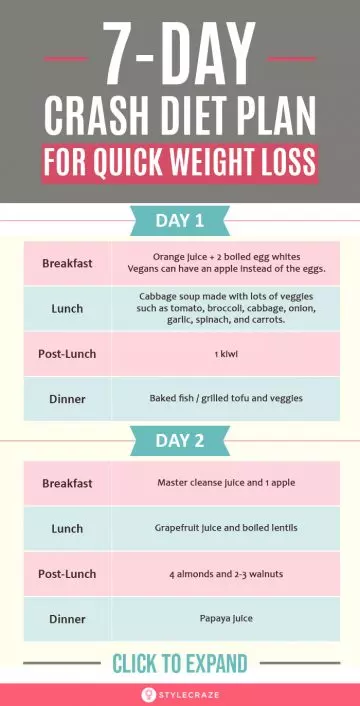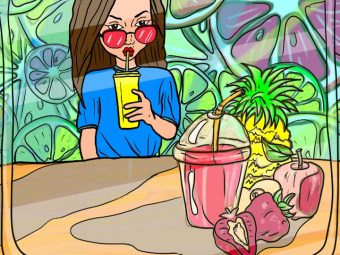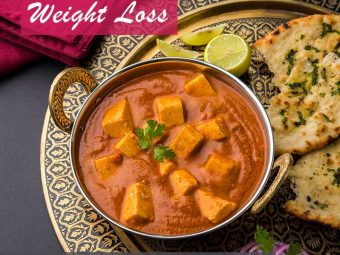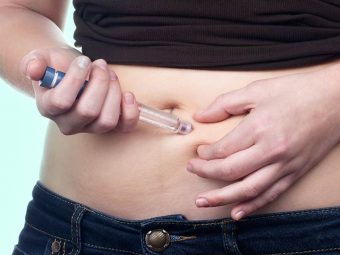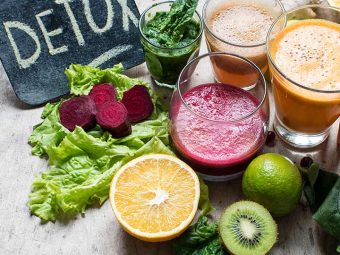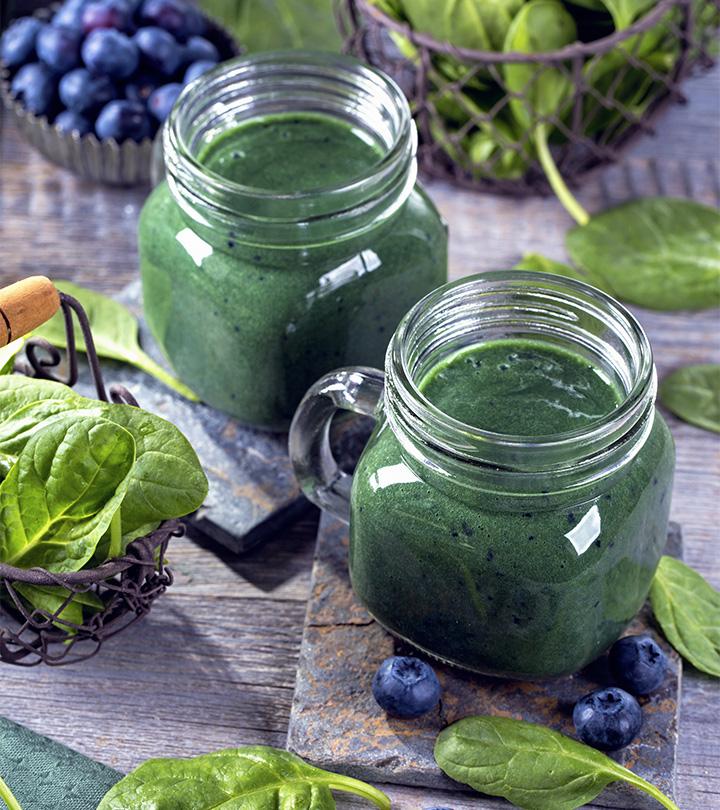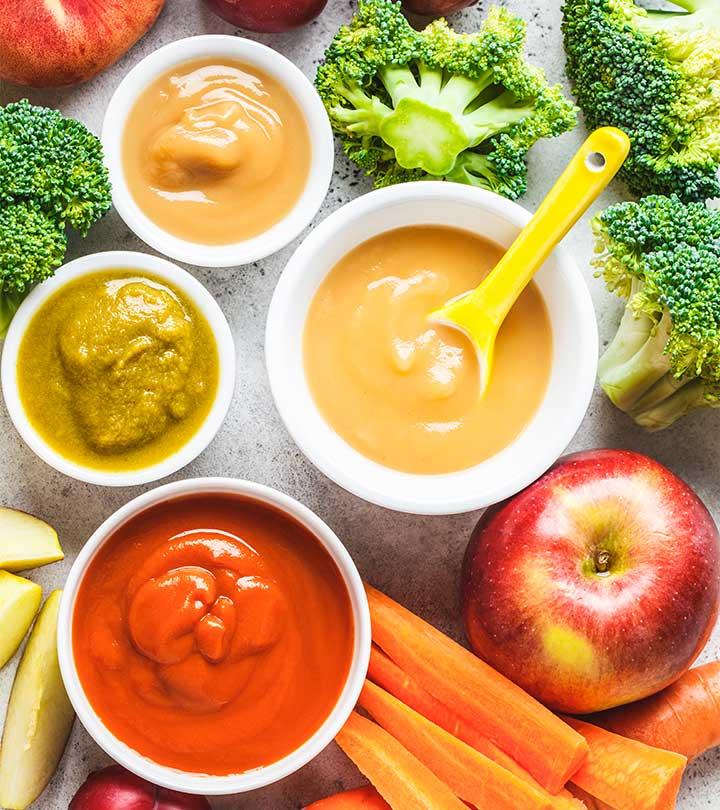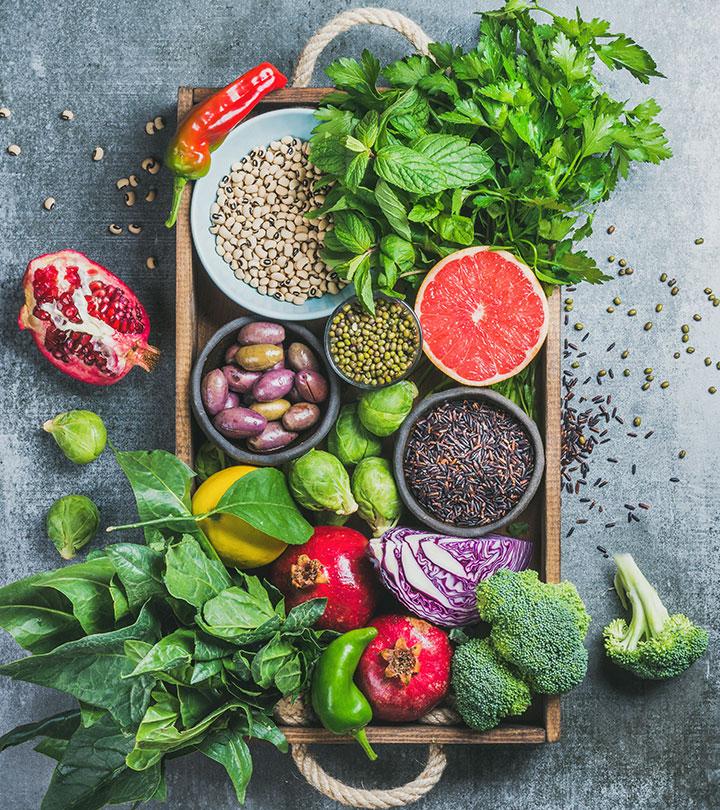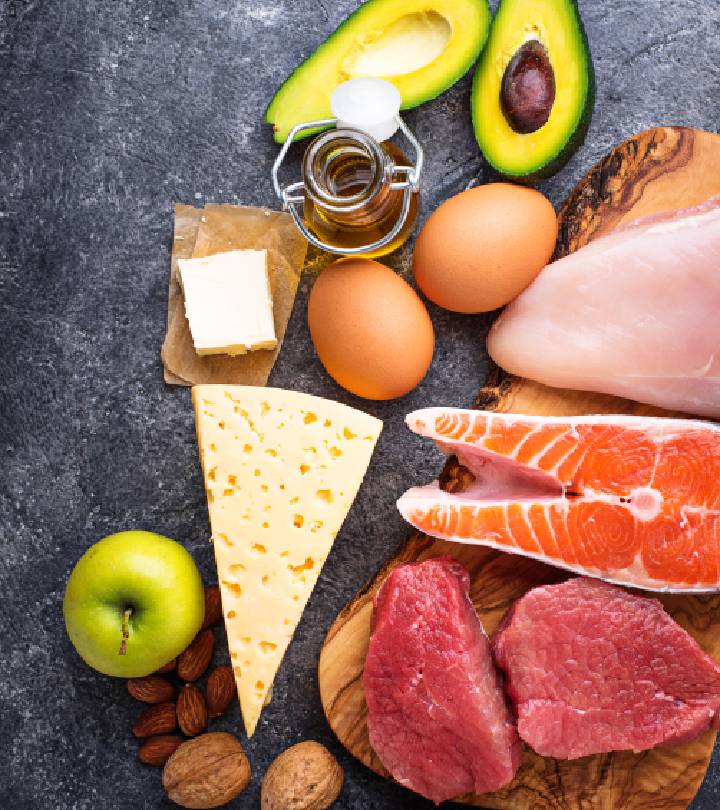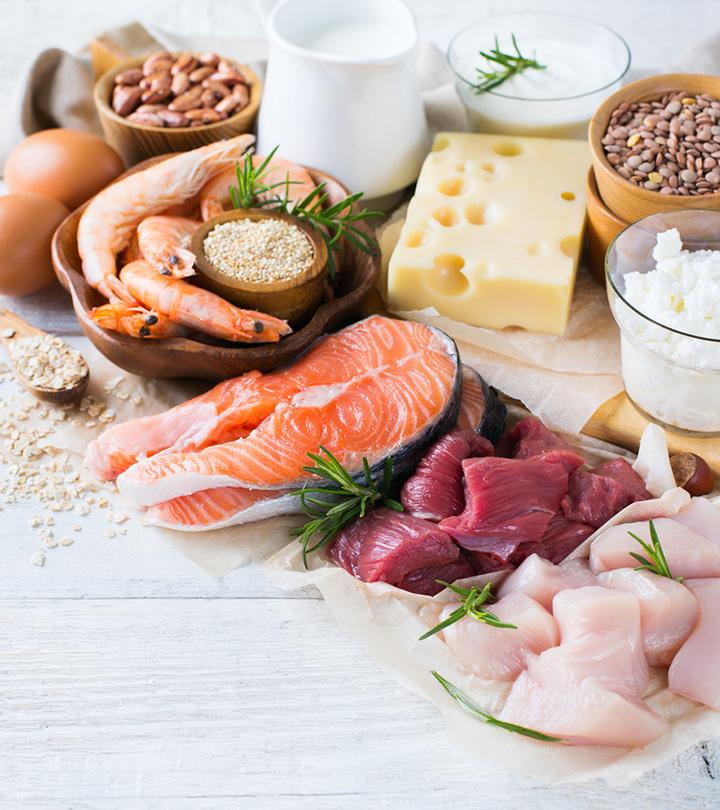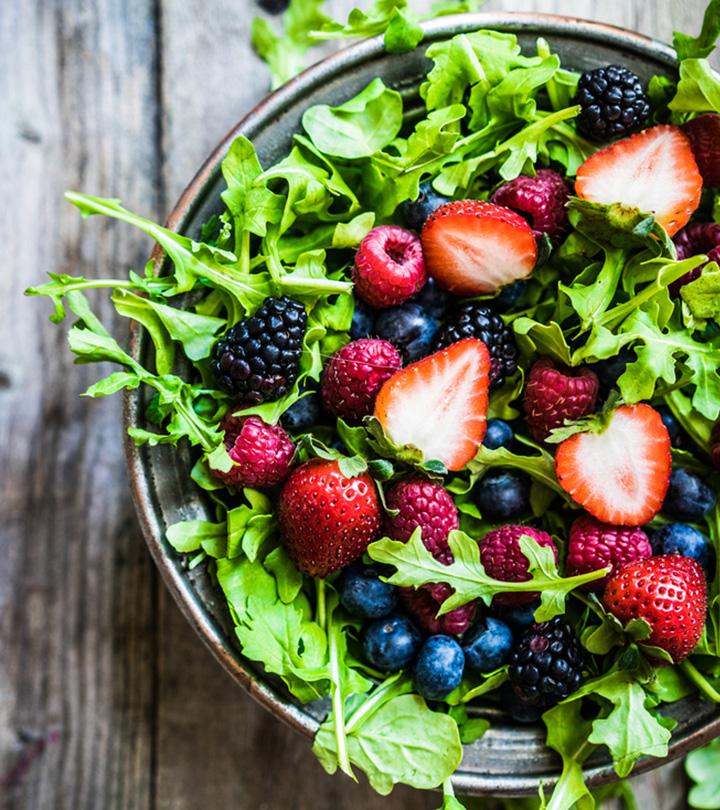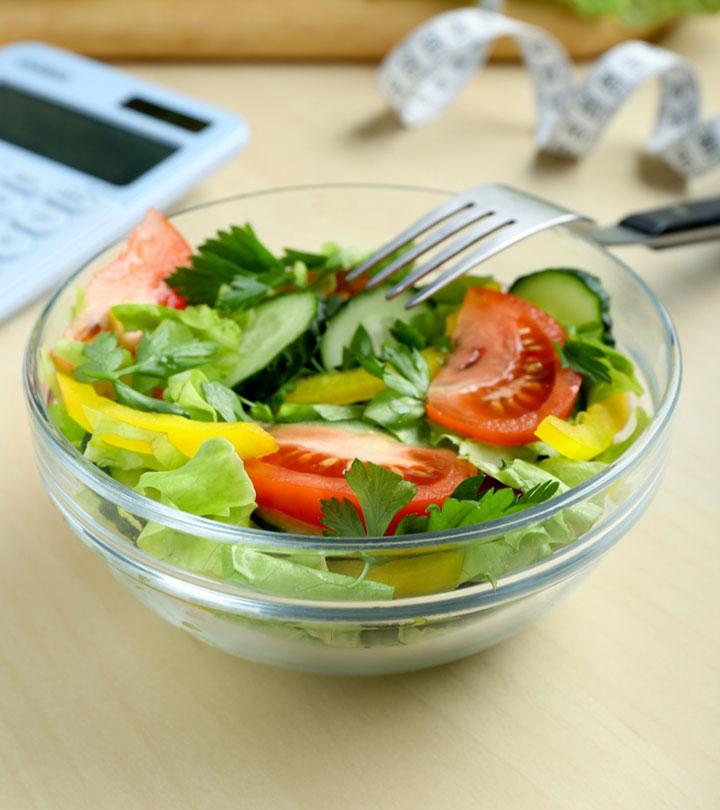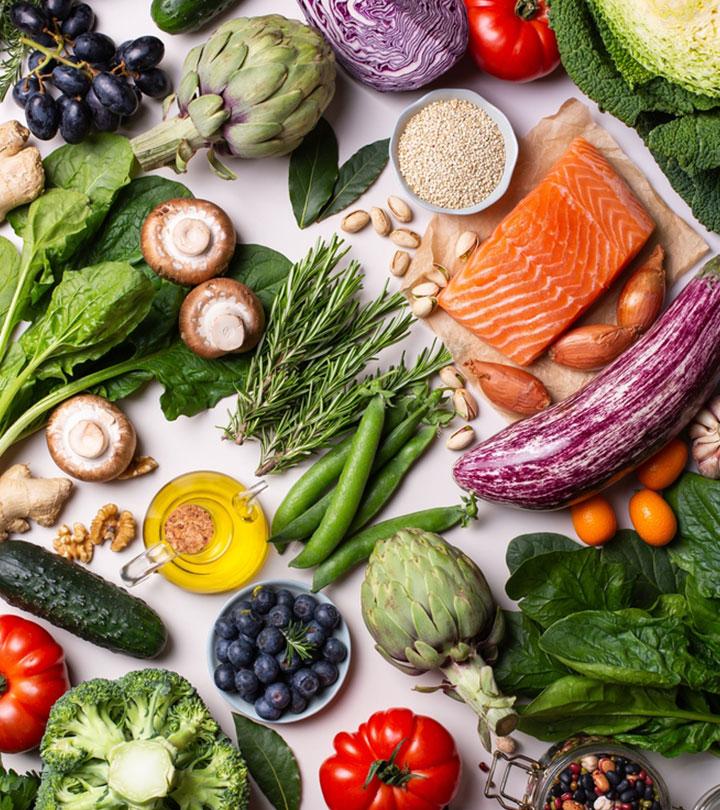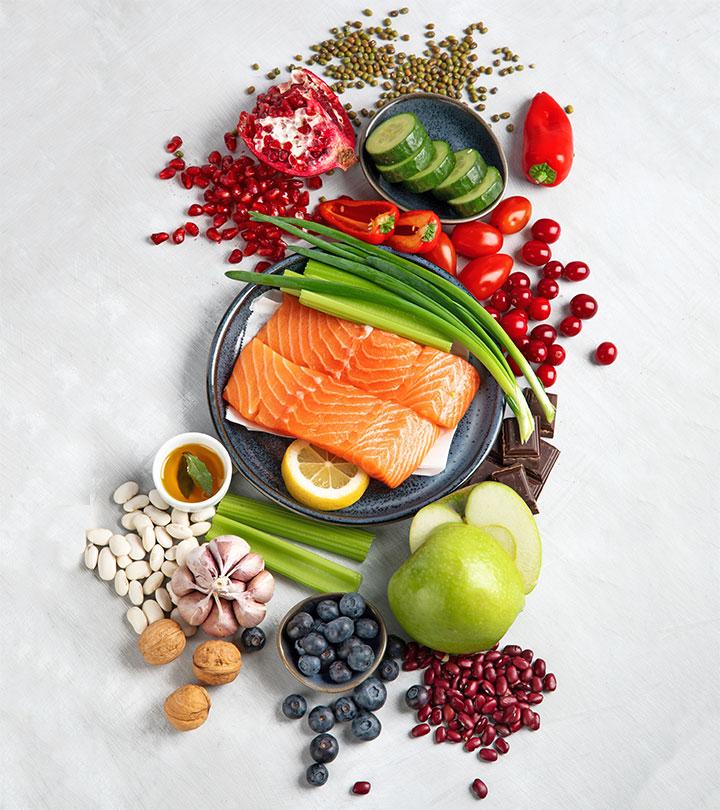Best Crash Diet For Fast Weight Loss, Diet Plan, Side Effects
Learn the benefits and risks of getting on a crash diet and know how to do it safely.

Image: Shutterstock
A crash diet is one of the fastest ways to lose weight. It restricts calorie intake and is good for short-term weight loss. Jesse Feder, Clinical Dietitian at the Memorial Regional Hospital South, says, “A 7-day crash diet is when someone drastically changes their diet by reducing their caloric intake significantly. For example, if you typically have 2000 calories a day, a crash diet may have you eating 1000-1200 calories a day.”
But being on a very low-calorie diet for a long period may lead to eating disorders, compromised immunity, hair loss, and irregular menstruation (1), (2).
However, there’s a way to crash diet safely for an upcoming event. Check out the 7-day crash diet plan, safety, and risks. Read on!
 At A Glance: Crash Diet
At A Glance: Crash Diet- Principle: A diet with a low calorie count followed for a few days to lose a significant amount of weight.
- Purpose: To aid in quick weight loss.
- Who Is It For: People who need to lose weight quickly for medical procedures.
- Duration: Short-term
- Who Should Avoid: People with nutrient deficiencies, (a history of) eating disorders, or physically active lifestyles, and those who are pregnant or lactating.
- Cons: May weaken the immune system, lower metabolism, disturb digestive functions, damage skin and hair health, and cause dehydration and weakness.
In This Article
What Is A Crash Diet?
A crash diet is a dieting method for shedding pounds in less time. It is a restrictive or a very low-calorie diet focused on rapid weight loss.
A crash diet is not meant for long-term weight loss. The results of a crash diet are short-lived, and you will gain the pounds right back if you do not eat healthy and workout. However, for an occasion right around the corner, you may try a crash diet. Here’s a list of popular types of crash diets.
 Quick Tip
Quick TipTypes Of Crash Diet

1. Master Cleanse
Quick weight loss diets like the Master Cleanse may help you lose 10 pounds in a week. It includes vitamin C-rich lemon juice, two to three teaspoons of maple syrup, and a pinch of cayenne pepper.
Cons – Fast weight loss diets like this one may not be sustainable for more than two days.
2. Juice Cleanse Diet
Juicing is a great way to be on a liquid diet without compromising on nutrients. Consume dietary fiber-rich and vitamin C-loaded fruit juices that may flush out toxins and rejuvenate your body (3). It is also good for the skin (4).
Cons – It may not be sustainable for more than two days.
3. Cabbage Soup Diet
The cabbage soup diet is a nutritious soup diet made mainly with cabbage and other veggies. All you have to do is consume this soup to lose water weight quickly and slim down.
Cons – Consuming only this soup for more than a day might cause boredom.
4. Grapefruit Diet
The grapefruit diet involves consuming half a grapefruit and other healthy foods in every meal. It may aid in quick weight loss without compromising on health (5).
Cons – Consuming grapefruit for every meal may cause nutritional deficiency and tooth enamel erosion, and it can be super challenging to eat only one type of fruit (6).
5. Hollywood Diet
The Hollywood diet has been popularized by Hollywood celebs and claims to cause a weight loss of 10 kg in just 48 hours. All you have to do is drink an herbal mix called “Hollywood diet,” which is available in supermarkets and online.
Cons – It is not doctor-approved. Your body may react to the herbs in the mix, and just drinking this mix will make you irritable and compromise on immunity.
6. Chicken Soup Diet
This diet requires you to consume chicken soup for seven days. You may add veggies of your choice to enrich the soup with vitamins and minerals. You may also have freshly pressed fruit juice as a snack.
Cons – It is not for vegans and vegetarians.
7. 500-Calorie Diet
This is a very low-calorie diet that reduces your daily caloric intake to 500 calories. It claims to cause rapid weight loss and recommends the use of meal replacement options like shakes and food bars at least two times a day.
Cons – It is not doctor-approved and is unsustainable.
8. hCG Diet
This is a very low-calorie and low-fat diet plan that promises a rapid weight loss of 0.5–1 kg per day. It is divided into three phases, two of which require you to have hCG supplementation (that is primarily used to treat fertility issues). The weight loss phase of the diet allows the consumption of only 500 calories per day for 3 to 6 weeks.
Cons – It is highly unsustainable and the hCG supplementation is not FDA-approved.
Clearly, crash diets are nutrient-deficient diets, but they aid in quick weight loss in a short period. If you want to try it, do it for three days or seven days. Find an easy 7-day crash diet plan below.
7-Day Crash Diet Plan For Quick Weight Loss
How much weight will you lose after being on a crash diet for three to seven days? Find out below.
How Much Weight Will You Lose?
You may lose up to 10 pounds (4.5 kg) in seven days. You may lose water weight in the first three days, and your body may shift to the fat-burning mode in the next four days.
Jesse Feder says, “Crash diets usually do burn fat, but due to the drastic changes made, you may also lose lean muscle tissue as well.”
Do Crash Diets Work? What Chrissy Arsenault, RDN, Says
Chrissy Arsenault, RDN, says, “Crash diets often involve extremely low-calorie intake and often restrictive food choices. While you may see some initial weight loss, crash diets are generally not recommended for long-term weight management or overall health. Because of their restrictive nature, crash diets can result in potential nutritional deficiencies and negative health consequences, such as slowed metabolism, regaining weight, and muscle loss (rather than fat loss, which is what most people consider desirable when seeking weight loss!).”
She also states, “Any weight loss that you see may also be as a result of water loss from extreme restrictions. Additionally, crash diets often do not contain essential nutrients that your body needs to function – a nutrient-dense diet consists of vitamins, minerals, macronutrients, and micronutrients, which crash diets often do not. You’ll often find yourself gaining the weight right back.”
Crash diets are only meant for short-term weight loss. Does that mean that they are not safe? Find out in the next section.
Is Crash Diet Safe?
Crash diets are safe if done for one to two days. Sometimes, doctors recommend crash diets to people who need to lose weight quickly for surgery. But being on a very low-calorie diet for a prolonged period, without the supervision of a licensed professional, might make you land in hot water.
According to Jesse Feder, “Crash diets do not work since they are drastic, unsustainable changes. The changes made are not things people can typically stick with for long periods of time. Then, once the diet is over with, people tend to return to their old eating habits and gain the weight right back.”
How can you crash diet safely? Scroll down to find out.
[Read – What Is The SlimFast Diet]
How To Crash Diet Safely
Here’s how to crash diet safely:
- Choose A Crash Diet That’s “Doable”– Crash diets are emotionally taxing, but when you have so many options, choose one that is convenient for you. If only eating an apple a day is not your thing (must be supervised by a doctor), go for a soup diet that will keep you full and nourished.
- Cut Back On Refined Sugar– Avoid consuming refined sugar or foods containing it, like cake, pastry, doughnuts, ketchup, dips, candies, and chocolates.
- Snack Smart – Going on a crash diet can be easy if you know how to snack smart. Consume low-calorie, nutrient-rich foods like fruits, baby carrots, cucumber, unsalted nuts (limited quantity), half a cup of plain yogurt, home-baked veggie chips with yogurt dip, and green tea.
- Do It For A Limited Time– Every crash diet has a time duration, say, two days or seven days. Stick to the specified duration, and you will not overwhelm your body with low-calorie diets. If losing weight is not urgent, you can follow the 1200 or 1500-calorie diet.
- If Possible, Avoid Social Gatherings– You know what happens when you go to parties and gatherings – diet goes out the window! Hence, it is best to avoid parties. If you need to offer support to a friend or a family member (and you happen to live in the same city), carry your food or choose foods that will not throw you off your diet.
- Avoid Alcohol– Alcohol gets converted to sugar, which gets stored as fat. Also, drinking alcohol while on a crash diet may cause glucose imbalance in your body.
- Refrain From Vigorous Exercise– If you are on the Master Cleanse or Juice Diet, it is best to avoid exercising. You may do light stretching and yoga but not full-fledged cardio and strength training.
- Drink Water With Rehydration Salts – Crash dieting might require you to drink water or fruit juice frequently. Drink water with rehydration salts at least twice a day to keep your electrolytes balanced.
Note: Talk to your doctor before you start the crash diet.
The idea behind a crash diet is the over-restriction of calories, which would reduce body fat and weight as a consequence.
The following graph is taken from a six-month research study on the impact of following a diet with a 25% calorie restriction. It shows a progressive reduction in body weight in those following the diet compared to those who weren’t.
Effect Of 25% Calorific Restriction On Body Weight
Source: Caloric Restriction in Humans: Impact on Physiological, Psychological, and Behavioral OutcomesIf you crash diet safely, you can reap the following benefits.
Benefits Of Crash Dieting
- May lead to quick weight loss
- May give instant satisfaction
- May be good before certain surgeries (has to be approved by your doctor)
- May be less costly
Cam Fu, a blogger, recounted his experience of doing a crash diet for 8 weeks for a diet competition. He said, “In total, I lost 37.2 lbs. I am currently at the lightest I have weighed in at least five years (i).”
You must keep a few points in mind before you start crash dieting.
Things To Do Before Going On A Crash Diet
- Count the number of days you have before the special event. If it is a month away, try the Mediterranean diet and do some cardio to lose weight.
- Talk to a dietitian or your doctor, especially if you are a new mother, have undergone surgery, have a BMI over 30, are on antidepressants or any other medication that hinders weight loss, or are over 50 years.
- Stock your kitchen with foods you are going to consume in the coming week. Toss out all other “distraction foods.”
- Keep a journal. You will undergo mood swings. Writing a journal can help during those times.
But things can go quite wrong when you misuse the crash diet. Here are the side effects:
What Happens When You Misuse The Crash Diet?
Crash Diet Side Effects
 Quick Tip
Quick TipIt is really easy to get carried away and misuse crash diets. In that case, the following may happen:
- Eating disorders
- Metabolic slowdown
- Anxiety
- Depression
- Muscle loss
- Slowed cell and organ function
- Compromised immunity
- Impaired brain function
- Weak bones
- Poor attention
- Hair loss
- Skin problems
- Unhealthy weight loss
Crash dieting for a prolonged period is unhealthy and should not be done without professional guidance. This brings us to the next topic – should teenagers crash diet? Since the crash diet gives quick results, many teenagers want to follow it. But should they? Find out below.
Should Teenagers Crash Diet?
No, teenagers should not crash diets. The ages of 13 to 19 are part of the growing phase. Going on crash diets or using extreme weight loss methods might stunt your growth, affect your mental health, and might lead to detrimental weight loss. It is seen as a quick fix for weight loss, but it includes an unsustainable diet plan, and in the long term, it won’t show the desired results and can lead to health issues. If you do need to lose weight, seek the help of a professional.
Talk to a registered dietitian and get a customized diet chart. You must also be physically active and aim to be fit and strong. Also, remember, you don’t have to fit into any size to feel beautiful and worthy. Be healthy and happy, and pursue your dreams.
Here’s the takeaway message.
Crash Diet Is Not For Long-Term Weight Loss
Crash diets are unsustainable and unhealthy. The weight that you lose is mostly water weight. Moreover, most people tend to misuse these diets, which causes health issues. We do not recommend going on an unsupervised crash diet. You must consult your doctor before trying out our sample 7-day crash diet plan.
Curious about crash diets? Understand the truth behind them in this insightful video. Learn their potential risks and discover healthier alternatives for sustainable weight loss. Watch now and make informed choices for your well-being!
Infographic: Yoga Poses To Do While On A Crash Diet
Crash diets are usually very low-calorie diets that help you shed those stubborn pounds by severe calorie restriction. Generally, a combination of diet and exercise is recommended to lose weight quickly. However, it is best to start off with light exercises like yoga to prevent excess strain on your body.
Check out the infographic below to learn about the top yoga poses you should include in your fitness routine to maximize the results of your crash diet. Illustration: StyleCraze Design Team
Crash diets are the quickest way to lose some pounds quickly, but they can turn out to be extremely dangerous if misused. They have to be treated as short-term weight loss options. Following these fad diets, which involve an unbalanced diet with taking less than 800 calories a day, for more than a week is not advisable. Your body may get deficient on the nutrient front and lead to adverse effects like weak immunity, nausea, muscle loss, etc. lead to adverse effects like weak immunity, nausea, muscle loss, etc. Consult a doctor if you are a new mother, obese, old, or on antidepressants. These unhealthy diets are a strict no-no for teenagers as they may impact their physical and mental growth. If you have a larger time window (like a month) for a special occasion, opting for the Mediterranean diet is advisable.
Frequently Asked Questions
What should I do after a crash diet?
Jesse Feder advises, “If you decided to do a crash diet, then afterward I would highly recommend seeing a dietitian that can help provide you with more sustainable options/tips to keep the weight off. This will allow you to develop healthy eating habits that can be followed throughout your life, rather than relying on crash diets.” It is just a quick-fix diet.
Is it possible to lose 10 pounds in a 3-day crash diet?
No, you will not be able to lose 10 pounds in 3 days. That’s a bit too ambitious and dangerous. Extreme dieting is not a sustainable option. In 3 days, you will lose the water weight, which can go up to 2-3 pounds.
How can I lose 20 pounds in a week?
Losing 20 pounds in a week is not possible unless you go for weight loss surgery. In a week, you can lose 1-2 pounds if you follow a low-calorie diet and workout. If you follow a 7-day short-term diet, you may lose up to 10 pounds in a week.
What should I stop eating to lose weight?
Stop eating sugary foods (soda, sugar-free foods, candy, cake, pastry, doughnut, cookies, macaroon, and sweets), foods loaded with trans fats (like cookies, biscuits, chips, fries, fried chicken, and frozen pizza), high sodium foods (like soda, fries, bottled sauces, ketchup, ready-to-eat foods, frozen foods, and pickles), refined flour, white rice, and alcohol.
How can I lose belly fat fast?
To lose belly fat fast, you must go cut at least 500 calories from your current diet. For example, if you consume 2000 calories per day, start consuming 1500 calories. You must also start doing cardio and ab exercises every alternate day.
Is Keto a crash diet?
No, keto is not a crash diet. It is a high-fat, moderate protein, and low-carb diet. Crash diets are typically very low-calorie diets. Keto diet is a high-calorie diet.
Is SlimFast a crash diet?
No, SlimFast diet is not a crash diet. You consume 6 meals per day in this diet and lose up to 1-2 pounds in a week.
What can I do to recover after a crash diet?
Increase your calorie intake gradually, but keep a check. Do not start eating high carb foods, more sugar, and fat just after the crash diet. Continue eating veggies, fruits, and proteins in bigger portions now, and drink a lot of water.
What’s wrong with crash dieting (or controlled anorexia)?
Anorexia is an eating disorder. A crash diet will not go wrong until you do not follow the dietitian’s or doctor’s instructions. Many of us crash diet by starving ourselves to lose more weight in a short span of time. That’s not the way to go about it. Consume small portions of all kinds of healthy food.
How does a crash diet affect health and metabolism?
Crash dieting for a prolonged period will affect your body’s normal activities. As it is a low-calorie diet, your body will be deprived of the nutrition that is required for it to function properly. You will start feeling weak and end up weakening your body’s immune system. As you starve for longer hours, the body starts accumulating whatever food it gets. This reduces the metabolic rate and leads to a host of eating disorders. Also, this can lead to weight gain instead of weight loss.
Can a crash diet cause diabetes?
As crash diets are low-calorie or starvation diets, they have the potential to cause insulin resistance and overt diabetes mellitus (7).
Key Takeaways
- There are various types of crash diets such as master cleanse, juice cleanse, cabbage or chicken soup diet, and Hollywood diet.
- One week of crash dieting may cause weight loss but the weight loss would not be sustainable.
- Crash diets may be dangerous as they may cause nutrient deficiencies, and weight gain afterwards, and may put an individual at a higher risk of developing eating disorders.
- Consult a doctor before going on any crash diet specifically if you have underlying medical conditions.
- A healthy diet combined with exercise is the correct way to achieve sustainable weight loss.
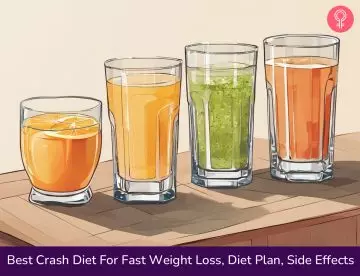
Image: Stable Diffusion/StyleCraze Design Team
Personal Experience: Source
StyleCraze's articles are interwoven with authentic personal narratives that provide depth and resonance to our content. Below are the sources of the personal accounts referenced in this article.
i. How to Crash Diet: 10 Ways How I Lost Almost 40 lbs. in 8 Weekshttps://camknows.blogspot.com/2010/03/how-to-crash-diet-10-ways-how-i-lost-40.html
References
Articles on StyleCraze are backed by verified information from peer-reviewed and academic research papers, reputed organizations, research institutions, and medical associations to ensure accuracy and relevance. Read our editorial policy to learn more.
- Dieting in adolescence, Paediatr Child Health, US National Library of Medicine, National Institutes of Health.
https://www.ncbi.nlm.nih.gov/pmc/articles/PMC2720870/ - Pros & cons of some popular extreme weight-loss diets, Indian Journal of Medical Research, US National Library of Medicine, National Institutes of Health.
https://www.ncbi.nlm.nih.gov/pmc/articles/PMC2720870/ - Ascorbic Acid Promotes Detoxification and Elimination of 4-Hydroxy-2(E)-nonenal in Human Monocytic THP-1 Cells
https://www.ncbi.nlm.nih.gov/pmc/articles/PMC2730585/ - The Roles of Vitamin C in Skin Health
https://www.ncbi.nlm.nih.gov/pmc/articles/PMC5579659/ - The effects of grapefruit on weight and insulin resistance: relationship to the metabolic syndrome
https://pubmed.ncbi.nlm.nih.gov/16579728/ - The influence of different factors on in vitro enamel erosion
https://pubmed.ncbi.nlm.nih.gov/8242676/ - Starvation diet and very-low-calorie diets may induce insulin resistance and overt diabetes mellitus, Journal of Diabetes and its Complications, US National Library of Medicine, National Institutes of Health.
https://pubmed.ncbi.nlm.nih.gov/8777329/





